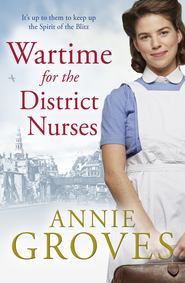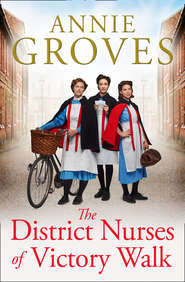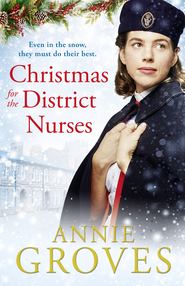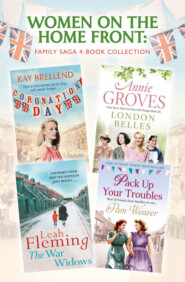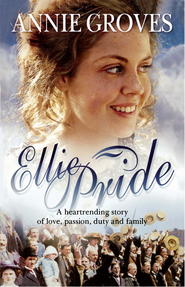По всем вопросам обращайтесь на: info@litportal.ru
(©) 2003-2025.
✖
Where the Heart Is
Автор
Год написания книги
2018
Настройки чтения
Размер шрифта
Высота строк
Поля
FOUR (#ulink_bbae1d6e-2ea2-5904-8379-e7d6cbb6babf)
Emily decided that it was a good job that Tommy, the boy she had found half starved and freezing, living off scraps at the back of the theatre in Liverpool where her good-for-nothing husband was the manager, wasn’t here to see her peering anxiously out of the kitchen window like this. He’d be bound to ask questions. He was a bright boy, was Tommy, and no mistake, and all the brighter too since they had left Liverpool and come to live here in Whitchurch. Happy as larks, she and Tommy were, with their tacit agreement that neither would reveal to anyone else his or her past or the fact that they were not even related, never mind aunt and adopted nephew, as everyone now believed them to be.
Or at least Emily had been happy. Until last week when she had gone and spoiled everything, like the silly fool she was, by going and giving Wilhelm, the German POW who kept her vegetable garden so productive for her, a pair of thick woollen socks she had knitted for him.
Of course he wouldn’t want to come here any more now that she had gone and made a fool of herself – yes, and probably made him feel like a fool as well, embarrassing him with her gift; her, a plain woman who had never been what you might call pretty even in her youth, and who no man, especially a handsome, well-set-up man like Wilhelm, would want to think admired him. A daft lonely married woman, who had no right to be knitting socks for any man other than her husband. Not that he would have welcomed hand-knitted socks. A bit of a dandy Con had always considered himself.
Poor Wilhelm had probably had his fellow POWs laughing their heads off at him on account of her gift. Why hadn’t she just left things as they were instead of behaving so daft and losing Wilhelm’s company into the bargain?
It was over a week now since she had given him the socks and she hadn’t seen him since. Normally he appeared most days, not spending as much time here as he had done in the summer, of course, since it was winter and there was plenty to keep him busy at Whiteside Farm where he and some of the other POWs worked, but he’d been here most days, tidying the vegetable garden and even insisting on doing other little jobs for her, like fixing that loose handle on the back door and sorting out the gutter blocked with autumn leaves.
She’d enjoyed the few minutes they’d usually shared together when she took him his cup of tea and a bit of something to eat – looked forward to them, in fact – and now it was all spoiled thanks to her own stupidity. What on earth had possessed her? Hadn’t she learned anything from the misery of her marriage to Con? Her husband had been unfaithful to her from the day they had married, and the truth was that she’d been glad to leave him behind in Liverpool.
The trouble was that she hadn’t really thought through just how her knitting Wilhelm those socks might look. All she’d thought of was his poor cold feet in those thin Wellington boots he always wore. It hadn’t been until she mentioned after church on Sunday about knitting the socks, and Biddy Evans, who was related to old Mrs Evans and her daughter, Brenda, who ran the local post office, had given a little tinkling laugh and said so loudly that everyone around them must have heard her, ‘Knitting socks for a POW! Well, I never. You’ll have him thinking you’re sweet on him next,’ that Emily had realised just what kind of interpretation others, including Wilhelm himself, might put on her gift.
Thankfully her kind neighbour Ivy Wilson had immediately said that Biddy was talking nonsense and that Emily was to be applauded for her charitable act, but of course the damage had been done by then and Emily had hardly dared look at anyone since when she went shopping, she felt so uncomfortable and self-conscious about what Biddy had said.
She was glad that it was still winter and the days short. That way Tommy wasn’t going to start asking when he came in from school why Wilhelm hadn’t been round. Proper fond of Wilhelm, Tommy was. It did a boy good to have a decent hard-working man around, not like that feckless husband of hers. Not that he had approved of her taking Tommy in, not for one minute. But then it was her money they’d been living on and her house they’d been living in, and for the first time in her marriage Emily had stuck to her guns and told her husband that if it came to a choice between him and Tommy then she was choosing Tommy.
Now that she had done exactly that she was happier than she had ever been in the whole of her life, or at least she had been until she had gone and made a fool of herself with those socks and frightened Wilhelm away.
‘What are you still doing here, Lena? Your shift finished half an hour ago. Gavin will have something to say to me, I’m sure, if he thinks I’m making his wife work longer than she should,’ Bella teased her billetee, before bending down to look into the pram where Lena’s nearly three-month-old baby daughter, Janette, named after Gavin’s mother, Janet, was smiling up at them both, her big brown eyes wide open, her soft dark curls escaping from under her white knitted bonnet, one fat little hand lying on top of the smart white coverlet embroidered with yellow daisies that had been made from an old dress of Bella’s.
‘And how is my precious, precious niece, the prettiest angel that ever was?’ Bella cooed at the baby, who immediately dimpled her a delighted smile.
‘Spoiled rotten by you and Gavin, and Gavin’s mum, and just about everyone else that she winds round her little finger, that’s how she is,’ Lena laughed, but it was plain that she adored her baby.
Behind them the walls of the nursery, painted a bright sunny yellow by Lena’s husband, Gavin, gave the day room an air of warmth no matter what the weather was outside, the small tables and chairs spotlessly clean, just like the cots and small beds in the ‘sleeping room’ beyond the day room, where the children had their afternoon naps, in comfortable and safe surroundings, watched over by Bella’s carefully selected and trained nursery staff.
‘I was going,’ Lena continued, ‘but Mrs Lewis was late picking up her Cheryl, and so I hung on because I wanted to tell her about Cheryl being a bit off colour and not wanting her dinner.’
Bella was very proud of the nursery in Wallasey, of which she was the manageress. All her girls were handpicked by Bella herself, but there was no doubt in Bella’s mind that Lena was the best of them all. Even so, she didn’t want Gavin thinking that she was taking advantage of Lena and expecting her to work longer than she should. Gavin and Lena were newly married, after all, and the last thing Bella wanted to do was to cause trouble between them.
Lena loved Gavin, Bella knew that, but Lena also felt a strong sense of gratitude towards her. Such a strong sense of gratitude, in fact, that Bella felt she had to be especially careful never to do or say anything that would in any way hurt Lena.
It had been totally out of character for her to take Lena under her wing, Bella would have been the first to admit. Before knowing Lena, she had been selfish and uncaring. But the war and the problems it had brought her, along with the responsibility she felt towards Lena, had changed her, and now Bella knew that she was a very different person from the Bella she had been in 1939 on the eve of her own marriage.
That Bella seemed so alien to her now.
It had taken betrayal by her husband, widowhood, falling in love with the wrong man, having to cope with her father’s desertion of her mother, and her brother’s abandonment of Lena, the girl he had so carelessly impregnated before marrying someone else, to change her into the Bella she was now: a Bella who truly knew the value of friendship and kindness and doing one’s bit for others and a Bella who had suffered the pain of forbidden love and the sacrifice that had entailed for the sake of others. A Bella who no longer felt the need constantly to scheme to make sure that she was considered the prettiest and most sought-after girl in the area, and a Bella who longed only to be the very best person she could be. The Bella who was truly worthy of the love of the man who could never be hers, but who she knew she would love for ever – Jan Polanski, the Polish Air Force pilot, whose mother and sister had been billeted with Bella at one time, and whose marriage to the daughter of a close family friend meant that no matter how much he and Bella loved one another, they could never be together.
‘Well, you must go now,’ Bella warned Lena, ‘otherwise there will be no dinner on the table for Gavin when he comes home from working on the river.’
Gavin was a junior river boat pilot – one of the men who brought safely into dock the convoys of ships that crossed the Atlantic in such dangerous conditions to bring much-needed supplies into the country.
‘However, before you do go, there’s something I want to say to you. It’s about the house.’
Immediately Lena gave Bella an anxious look. Lena and Gavin were now living with Bella in the house Bella’s father had given Bella and her husband when they had first married, and which now belonged to Bella. Guessing what Lena was thinking, Bella gave a quick shake of her head.
‘No, it isn’t anything for you to worry about. It’s my mother, Lena. I don’t have to tell you the situation.’
Lena knew that Bella’s mother, Vi, who had been living on her own since, shockingly, her husband, Edwin, had left her to live with his secretary, had been very badly affected by her husband’s departure.
‘It’s ever such a shame that she’s taken your dad going off the way he did like she has, and I know how much it upsets you, her drinking like she does, and showing herself up in front of her neighbours. Oh …’ Lena paced her hand over her mouth and looked guilty. ‘I’m ever so sorry, Bella. I shouldn’t have said that. I didn’t mean to speak out of turn.’
As though Janette had sensed her mother’s concern she gave a small cry. Bella smiled down at her whilst Lena rocked the pram soothingly.
One of the things Bella insisted on was that no baby in her nursery was ever left to cry.
‘You could never do that, Lena. I don’t have any secrets from you,’ Bella assured her younger friend. ‘It’s true that Mummy is causing both herself and me embarrassment with her drinking, and it’s not good for her health either. Her doctor has told me that. When I called round the other day the cooker was left on. Lord knows what might have happened if I hadn’t decided to go and see her. That was the last straw really, Lena.’ Bella closed her eyes for a moment, remembering what a terrible fright it had given her to walk into her mother’s kitchen and see the ring on the cooker burning. ‘I can hardly sleep these days for worrying about her, so I’ve decided that little though it is, it’s what I want to do—’
‘You’re going to move her in with you?’ Lena guessed, adding immediately, ‘You’ll want me and Gavin to find somewhere else, I expect.’ Lena tried not to sound as low as Bella’s news made her feel. She knew how lucky she and Gavin were, and how generous it had been of Bella to let them live with her.
‘Would you mind, though, Bella, if just for now perhaps me and Gavin could move into Janette’s room with her? I don’t want to put you out, not when you’ve been so good and generous to us, but Gavin was only saying the other night that Mrs Stone, his old landlady, has let his room, and—’
‘No, Lena, please stop,’ Bella pleaded, holding up her hand to stem Lena’s outpouring of words, horrified that Lean would think that she would ask them to leave. ‘Of course I don’t want you and Gavin to find somewhere else. Lena, I thought you knew me better than that.’ Bella gave Lena’s arm a loving shake. ‘Haven’t we both already agreed that we are the sisters to one another that neither of us ever had? And isn’t little Janette here my niece, my own flesh and blood, and Gavin so clever and kind about doing things around the house and here at the nursery that he saves me a small fortune?’
All of which was true, Bella thought, mentally running through all the small jobs that Gavin did so willingly, often noticing that they needed doing before Bella did herself, and not just at the house but here too at the nursery, fixing rattling windows, cleaning out gutters and downspouts.
But more important than any of that was the love Lena gave her, the kind of generous freely given love that Bella had never known before, and that Bella truly believed had changed her and her life for the better.
‘Do you really think I would want to lose any of that, and most especially you? No,’ Bella answered her own question, ‘what I have decided to do is to make you and Gavin my official tenants for my house. That way you’ll have a spare room for when Gavin’s mum wants to come and stay, and I will move in with my own mother.’
For a few seconds, as she struggled to take in the generosity of Bella’s offer, Lena couldn’t speak. When she could she protested, ‘Oh, Bella, no. You’ve always said as how you value your own independence and how you could never go back to living under your mum’s roof.’
‘That was before,’ Bella replied calmly. ‘Mummy can’t possibly be left on her own any more and I’d never forgive myself if … well, if anything happened.’
As Bella’s voice fell away she couldn’t bring herself to look at Lena, knowing what she would see in the younger girl’s eyes. But she had no choice, Bella reminded herself firmly.
Lena’s tenderly sympathetic, ‘Oh, Bella …’ prompted her to admit, ‘I haven’t said anything before, but to be honest, Lena, Mummy isn’t looking after herself or the house properly. When I went round the other day there wasn’t a clean cup anywhere, and Mummy was looking dreadfully untidy. When I think of how smart she was, and how house-proud.’ Bella bit her bottom lip. ‘I feel guilty, Lena, because I’ve been pretending not to know how bad things are, not to see how much Mummy needs me to be there with her. I’ve been trying to blame my father—’
‘And why not? It was his fault, after all,’ Lena defended her best friend fiercely.
‘Yes, but, well, I’ve made up my mind, Lena, and tonight when I come in I shall start packing up my things so that I can move in with Mummy. It is all for the best, for you and Gavin and Baby, as well as for Mummy. You are a newly married couple, after all, and you should have a home all to yourselves,’ she told Lena generously.
‘Oh, that is so typical of you, Bella – that you put everyone else before yourself,’ Lena told her emotionally. ‘I shall miss you dreadfully, you know.’
‘And I you,’ Bella admitted. ‘But we shall see one another every day here, and I dare say that you and Gavin will invite me round for tea some Sundays,’ she added teasingly.
Lena’s ‘Oh, Bella,’ was muffled as she reached out and hugged Bella tightly.
After Lena had gone Bella turned to go to her office and then stopped, unable to resist giving the nursery a swift look of pride. The air was filled with the hum of quiet industry and sounds of contented babies and children. Bella had even managed to expand the facilities modestly in order to provide simple little lessons for those children who were ready for them – just learning their letters and that kind of thing, Bella had explained earnestly to Mr Benson, the senior civil servant in charge of the Government administration of nursery care for the area, an initiative allowing young women to work to help the war effort.
He had been very generous in his praise for her expansion, and had even managed to find her nursery some little slates and an easel from somewhere.
It was Bella’s ambition to have ‘her’ little ones ready for school, with their letters and figures all learned by the time they were ready to leave the nursery.
Their small kitchen provided simple nourishing meals for the children, satisfying the Government’s stringent rules and directions on nutrition. There was no cost-cutting in Bella’s nursery so that those who worked there could benefit at the children’s expense, and in fact Bella had a growing number of little ones under her wing who by rights should not have been there, but who, Bella had learned, were in need in one way or another, and who she had felt compelled to help: little ones who might not otherwise have had a good hot meal, or a bath, or a clean bed, to sleep in.






